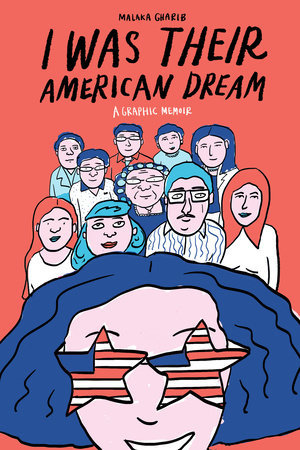A Review of Malaka Gharib’s I Was Their American Dream (Clarkson Potter, 2019)
![[personal profile]](https://i.gr-assets.com/images/S/compressed.photo.goodreads.com/hostedimages/1491408111i/22407843.png) xiomara
xiomara
A Review of Malaka Gharib’s I Was Their American Dream (Clarkson Potter, 2019).
By Stephen Hong Sohn
So, I wanted to pick something up that I could read over the course of one night instead of a couple of nights. In these circumstances, I often turn to graphic narratives. In this case, I read Malaka Gharib’s I Was Their American Dream (Clarkson Potter, 2019), which is an absolutely wonderful debut. I’m still going to start off with a major gripe: publication gods!? Why do you choose so often to NOT paginate graphic narratives? Your educators would love to be able to teach such spirited, animated debuts, but alas, the lack of page numbers would make this work absolutely challenging to teach. Now that I’ve given you my one major gripe, let’s let B&N take it from here:
“I Was Their American Dream is at once a coming-of-age story and a reminder of the thousands of immigrants who come to America in search for a better life for themselves and their children. The daughter of parents with unfulfilled dreams themselves, Malaka navigated her childhood chasing her parents' ideals, learning to code-switch between her family's Filipino and Egyptian customs, adapting to white culture to fit in, crushing on skater boys, and trying to understand the tension between holding onto cultural values and trying to be an all-American kid. Malaka Gharib's triumphant graphic memoir brings to life her teenage antics and illuminates earnest questions about identity and culture, while providing thoughtful insight into the lives of modern immigrants and the generation of millennial children they raised. Malaka's story is a heartfelt tribute to the American immigrants who have invested their future in the promise of the American dream.”
What I especially adored about this work was Gharib’s attentive and nuanced account of the asymmetries of a multicultural upbringing. Gharib’s not just Egyptian Filipino American but she also grows up in Cerritos, a city well known for its diversity. At one point, Gharib discusses going to Cerritos High School, which is coincidentally the place where I would go to for Korean school on Saturdays! What I can remember was the campus had a lot of gum stuck to the cement. But I digress! So Gharib’s mother is Filipina, while Gharib’s father is Egyptian. They get a divorce when Gharib is fairly young, and her mother soon remarries. Her father eventually moves back to Egypt. Gharib grows up with the direct influence of her Filipino extended family around her for about 9 months of year; she would go on to spend most summers in Egypt. Gharib spends much of her time ruminating on her interest in white/American culture, revealing what David L. Eng and Shinhee Han would call a form of “racial melancholia.” Over time, Gharib becomes much more aware of these inclinations, and this memoir’s reflective tonality is certainly what makes it so rich. One stylistic choice I found fascinating was how Gharib chose to render (at least generally so) her Filipino/a/x characters; they often boasted red hair! I sometimes teach a graphic novel course, where I ask the very pointed question: how can you be SURE that a character is actually Asian? This question brings into relief the stereotypical understandings we might hold when it comes to representation, and I love that Gharib dispels with some of the more traditional forms of depicting characters of Asian backgrounds. Gharib’s graphic novel can definitely be paired with the growing numbers of this form penned by Asian American writers, a group that includes Belle Yang’s Forget Sorrow, G.B. Tran’s Vietnamerica, and Thi Bui’s The Best We Could Do.
Buy the Book Here:
https://www.barnesandnoble.com/w/i-was-their-american-dream-malaka-gharib/1128997057#/
Review Author: Stephen Hong Sohn
Review Editor: Xiomara Forbez
If you have any questions or want us to consider your book for review, please don't hesitate to contact us via email!
Prof. Stephen Hong Sohn at sohnucr@gmail.com
Xiomara Forbez, PhD Candidate in Critical Dance Studies, at xforb001@ucr.edu
 comments
comments



